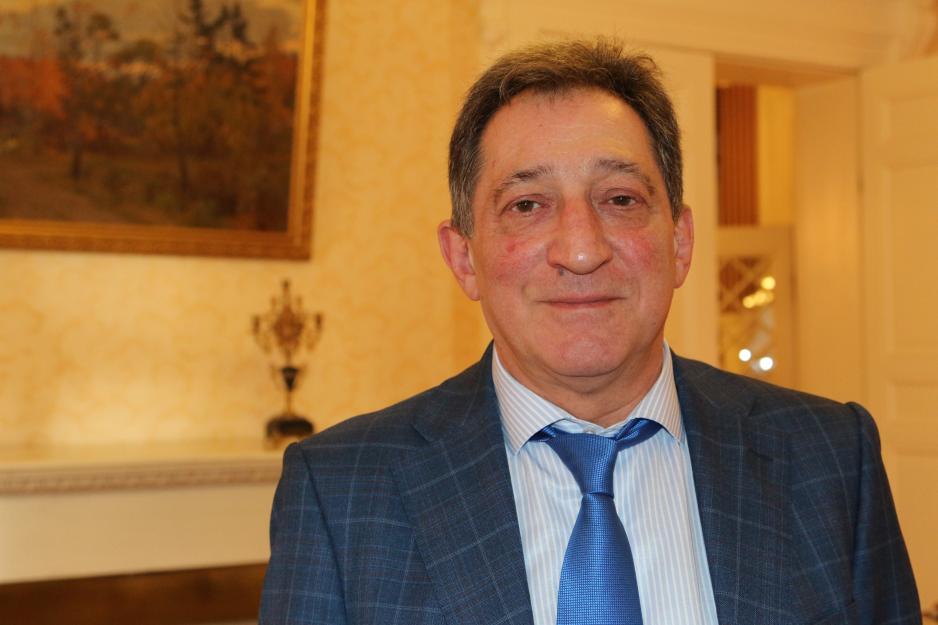- The Arctic states have a special responsibility, Russian Ambassador says

- Russia will considerably reduce its military activity in the north during the next three to four years. Then our military modernization program is complete, Russia's Ambassador to Norway Teimuraz O. Ramishvili claims. (Photo: Hege Eilertsen)
Russia is happy to enter into dialogue with new countries and organizations that want to join cooperation with the Arctic Council, however, Russia also believes that the Arctic ‘founders’ have a special responsibility for the development of the region.
Russia is happy to enter into dialogue with new countries and organizations that want to join cooperation with the Arctic Council, however, Russia also believes that the Arctic ‘founders’ have a special responsibility for the development of the region.
- We support strengthening the cooperation we have within the Arctic Council, Russia’s Ambassador to Norway Teimuraz O. Ramishvili says.
The Arctic Council was founded in 1996 and consists of eight Arctic member states: Norway, Russia, Iceland, Finland, Denmark/Greenland/the Faroe Islands, Sweden, Finland, the USA and Canada.
Economic development and improving of indigenous people’s living conditions are high on the Russian list of priorities.
The cooperation between Norway and Russia has been very limited for the past three years, as a consequence of sanctions going both ways, following Russia’s annexation of Crimea in 2014. In an interview published by High North News a fortnight ago, Ramishvili stated that the country at times perceives the international cooperation climate in the Arctic as more positive than the condition in her current bilateral relationship with Norway.
Peace and fruitful cooperation
When High North News asks how Russia wants to use the opportunities that lie in the intergovernmental forum Arctic Council, Ramishvili says that the country wants to continue the policy it leads today, focusing on securing international cooperation.
- The strategy we have built in the Arctic is based on current international law and dialogue providing a good foundation for regulating all questions related to the Arctic. Included in this, the Ambassador says, are questions related to establishing outer boundaries for the continental shelf in the Arctic Ocean.
He stresses that all the Arctic states – despite the current situation with strains on the international relations – want to continue the cooperation in the area. None of the 80 joint projects initiated within the framework of the Arctic Council have been halted, he says.
- Nor the ones initiated on Russian territory.
- Must not be politicized
Russia will strongly resist attempts at politicizing interternational cooperation in the region or attempts at bringing in elements of confrontational politics, the Ambassador says.
- Russia leans on the vision that the Arctic states have a particular responsibility for a sustainable development of the Arctic region. We therefore support a strengthening of the cooperation we have within the Arctic Council and the ‘Arctic Five’ (expression used to describe the five Arctic coastal states of Canada, Denmark/Greenland, Norway, Russia and the USA, editorial note.) and the Barents Euro-Arctic Council, he says.
Indigenous people and economic cooperation
In just over two months’ time, Russia’s neighbour Finland will take over the chairmanship of the Arctic Council. That happens in May, when the Americans have fulfilled their two-year term.
During the coming spring, the chairmanship of the independent, Arctic Council-initiated organization Arctic Economic Council is transferred to Finland.
- Up through the years, the role of the Arctic Council and the scope of activities aimed at sustainable developing of the Arctic region has increased considerably, Ramishvili says.
Russian authorities are, according to the Ambassador, in particular concerned with improving the livelihood and life quality of the population of the High North, and in order to achieve that, extensive economic cooperation is required.
- These priority areas require more attention, Ramishvili says.
- The unique thing about the Arctic is further emphasized by the fact that indigenous people’s organizations are permanent members actively involved with the activities of the Arctic Council. This provides close adjustments when it comes to join projects, he says.
- Economic development is vital
- The Arctic contribution to a sustainable developing of our country will just continue to increase. It is vital for us that we can secure a good environment for economic development together with other Arctic states, and that we develop cooperation through using updated technology and international expertise, Ramishvili says.
In addition to the eight Arctic member states of the Arctic Council, six organizations represent various indigenous groups across the Arctic that hold a position of permanent observers. The Council may grant non-Arctic states and organizations observer status. Japan, India, South Korea, China and Singapore are just a few of the countries that hold such status at present.
- There is an ever-increasing interest in the Arctic at present, from several states and international organizations, and many want to achieve observer status in the Council. Russia is open to dialogue and interaction with these actors. However, we are of the opinion that the states that are the founders of the Council hold a particular responsibility for securing a sustainable development of the Arctic, and that they intend to keep playing a lead role in the Arctic cooperation.
